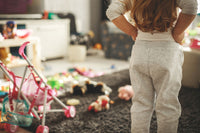By Kathryn Peck
I’m not sure who has more anxiety come Wednesday morning: me or my 2 year old. Once a week, I drop him off for a toddler class at the local nursery school. He’s got three siblings, so I thought he would enjoy going to “school” like the others and having a special time that’s just for him. I thought he would enjoy the toys at the school, the art supplies, and the other 2 year olds that are there. Turns out, he doesn’t.
I dread the tears that come Wednesday morning and the pleas from him to not go to school. I dread having to sneak away while he’s not looking as the teacher closes the door, and I am guilty of lingering in the hallway while he cries in the classroom, only to further break my own heart.
I dread the tears that come Wednesday morning and the pleas from him to not go to school.
This must be separation anxiety, something I hadn’t experienced with my other children. It’s a common phase of infancy and early childhood in which the absence or looming departure of a parent causes distress.
For children prone to separation anxiety, feelings of distress when a parent isn't near tend to surface around 8 months and can come and go through age 4 or 5.
They say there are things you can do to help prepare your child for school separation, like:
-
Visit the school, the classroom and the playground with your child before the first day.
- Make the teacher aware in advance. It can’t hurt to talk to someone about how to handle separation anxiety, especially someone who’s probably dealt with this before.
- Meet the students beforehand. Consider arranging a playdate with others in the class beforehand so there’s a familiar face when school starts.
- Bring a transitional object, like a stuffed animal, a small toy, or even something special in their pocket. According to child psychology experts, familiar items like these may help to ease separation anxiety and make your absence less emotional.
- Establish a goodbye routine. Children find comfort in rituals, so by setting expectations ahead of time, like you might a bedtime routine, children are often more untroubled by the transition and that builds trust.
- Stay positive. Kids look to their parents, and if they sense signals of distress, they are more likely to mirror those feelings. So even though you might not feel like it, smile and remind your child of how much fun they’ll have. (That’s not to say a parent should disregard their child’s feelings, of course; but there’s a time and place to address this, and it’s not at drop-off.)
When it’s time to go, go. As a parent, it’s hard to make the break, it might feel insensitive, but a clean break, without promises of “one more minute” is best for the parent and child (and all the other children in the class). Experts also remind parents not to be late for pickup, as it can cause a child even more anxiety and make dropping them off at preschool the next day that much harder.
Experts also remind parents not to be late for pickup, as it can cause a child even more anxiety.
There’s also the more simplified EASY method:
(E) Evaluate. As a parent, it’s important to maintain your composure and stay positive.
(A) Acknowledge. It’s important not to dismiss your child’s feelings altogether; you can recognize them without letting them control the situation.
(S) Stick to boundaries. Establish a good-bye routine and stick with it. Long, drawn-out goodbyes or promises of “one more minute” will not remedy the situation nor will it enrich your child’s school experience.
(Y) Yes. Find something that helps, be it a good-bye routine, a secret goodbye handshake or hug, a transitional object, etc.
Any or all of these tips might help a parent to deal with the tricky situation of a child who’s anxious about being dropped off at school. It will pass, but those minutes can seem like hours for a parent, and more often than not, that same child who was tearful at drop off is laughing at pickup.
-
About the author: Kathryn is the owner of Bicycle Pie and mom of 4 little ones. Also a writer, editor, and former owner of one of Boston's premiere baby boutiques, she continues to write about motherhood, children's products, family life, and all other things that test our skills and patience as parents.




